News
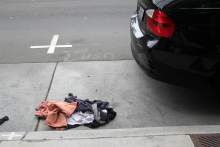
It was unclear to me why Jesus took the bodies but left the clothes, but as a middle schooler, the prospect of meeting my Lord and savior buck naked was horrifying.
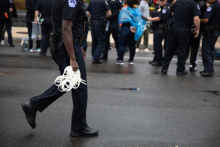
Less than a week into the new year, the country watched in shock as hundreds of rioters used metal pipes and tear gas against police to gain entry into the U.S. Capitol, ransacking congressional offices for several hours while the nation’s elected leaders, who had convened to certify electoral votes, huddled for cover. But faith-based communities and other justice advocates saw something like this coming.

The House of Representatives voted on Wednesday to make Donald Trump the first U.S. president ever to be impeached twice, formally charging him in his waning days in power with inciting an insurrection just a week after a violent mob of his supporters stormed the Capitol.
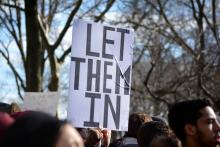
Three faith-based resettlement agencies say it will be easier to welcome refugees after a federal appeals judge ruled in their favor to block President Donald Trump’s executive order allowing local and state officials to refuse refugees.

In a statement, the International Bonhoeffer Society noted that the Christian nationalism Bonhoeffer opposed in Germany mirrors the powerful current of Christian nationalism in the U.S. that has helped bolster support for the president.

Across different faith traditions, a number of women faith leaders in the U.S. broke their own glass ceilings, each marking a historic first within their communities. Amid their diversity, all of the women interviewed here have one common piece of advice for Harris as she becomes the highest-ranking female elected official in U.S. history: Be fully yourself.
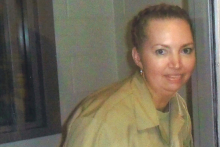
In the early morning of Jan. 13, following a day of attempted legal delays and despite documentation of severe mental illness stemming from childhood abuse, 52-year-old Lisa Montgomery became the first woman in decades to be executed by the federal government.
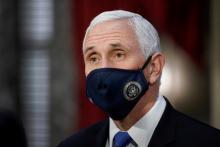
Vice President Mike Pence said in a letter to House Speaker Nancy Pelosi on Tuesday he is opposed to invoking the 25th Amendment to remove President Donald Trump from office. In the letter, Pence quotes from Ecclesiastes.

The FBI has warned of possible armed protests being planned for Washington, D.C., and at all 50 U.S. state capitals in the run-up to President-elect Joe Biden's inauguration on Jan. 20, a federal law enforcement source said on Monday.
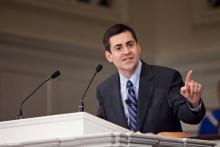
Russell Moore has called for President Donald Trump to be removed from office, saying that he is willing to lose his position as president of the Ethics & Religious Liberty Commission of the Southern Baptist Convention in doing so.
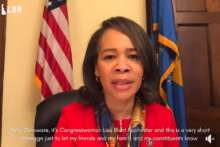
On Wednesday, symbols of Christian nationalism were on full display among many of those who stormed the U.S. Capitol. However, both before and after Wednesday's attacks, some legislators invoked the language of faith in a different way: to reject President Donald Trump's repeated attempts to to discredit the election and the insurrection it sparked.

An attempted coup, theological reflections, and how the internet's algorithms help radicalize young Americans.

“Every Republican politician and every far-right preacher who spread baseless lies about the election results” should be held accountable for the violence at the Capitol this week, said Nathan Empsall of Faithful America . “That process of accountability starts at the top, with Donald Trump.”

Despite advanced warnings of far-right demonstrations intent on wreaking havoc in Washington, D.C., Wednesday began as many pro-Donald Trump rallies have in weeks since the election: Spirited attendees in American flag apparel, some bearing the insignias of right-wing organizations like the Three Percenters, took pictures, mingled, and professed their ardent support of Trump – some going so far as to conflate the president with Jesus Christ.

As pro-Trump rioters broke into the Capitol on Wednesday to stop members of Congress from certifying the results of the 2020 election, some evangelical leaders denounced the violence — including elected representatives who continued to support President Donald Trump’s debunked claim that the election was “stolen.”

When a mob of supporters of President Donald Trump stormed the Capitol building on Wednesday afternoon, many carried weapons, wore red MAGA hats, and draped themselves in the candidate’s flag. After legislators and their staff had been evacuated, Trump supporters entered the Senate floor. With them came a Christian flag.

In the months prior to the November 2020 election, progressive activists Jethro Heiko and Nick Jehlen partnered with Choose Democracy to create the Coup-o-meter in order to provide clear communication about how close the U.S. was to an anti-democratic usurping of power. By Wednesday afternoon, they had shifted the meter.
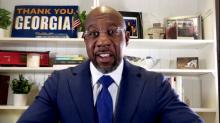
Editor’s Note: Rev. Dr. Raphael Warnock defeated Republican incumbent Sen. Kelly Loeffler in one of two Georgia runoff elections Tuesday. Below is the transcript of Warnock’s speech delivered early Wednesday morning.
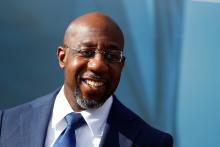
After a heated runoff election in Georgia, Rev. Dr. Raphael Warnock has won his bid for election to the United States Senate, defeating Republican incumbent Kelly Loeffler.
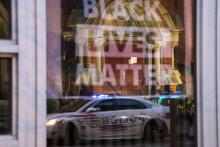
Black church leaders, anti-racist activists, and Washington, D.C., officials urged Washingtonians to exercise caution as they prepared for right-wing demonstrations on Wednesday as Congress convenes to certify the Electoral College votes in favor of President-elect Joe Biden.